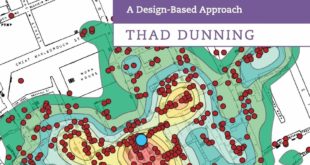The dangers of randomization idolatry How, then, can social scientists best make inferences about causal effects? One option is true experimentation … Random assignment ensures that any differences in outcomes between the groups are due either to chance error or to the causal effect … If the experiment were to be repeated over and over, the groups would not differ, on average, in the values of potential confounders. Thus, the average of the average...
Read More »Statistical significance and effect size (student stuff)
Statistical significance and effect size (student stuff) .[embedded content]
Read More »The shocking truth about econometric ‘precision’ and ‘rigour’
Leverage is a measure of the degree to which a single observation on the right-hand-side variable takes on extreme values and is influential in estimating the slope of the regression line. A concentration of leverage in even a few observations can make coefficients and standard errors extremely volatile and even bias robust standard errors towards zero, leading to higher rejection rates. To illustrate this problem, Young (2019) went through a simple exercise. He collected...
Read More »Propensity scores — bias-reduction gone awry
Propensity scores — bias-reduction gone awry .[embedded content]
Read More »Bayesian absurdities
In other words, if a decision-maker thinks something cannot be true and interprets this to mean it has zero probability, he will never be influenced by any data, which is surely absurd. So leave a little probability for the moon being made of green cheese; it can be as small as 1 in a million, but have it there since otherwise an army of astronauts returning with samples of the said cheese will leave you unmoved. To get the Bayesian probability calculus going you sometimes...
Read More »The geometry of Bayes theorem
The geometry of Bayes theorem .[embedded content] An informative visualization of a theorem that shows how to update probabilities — calculating conditional probabilities — when new information/evidence becomes available. But … Although Bayes’ theorem is mathematically unquestionable, that doesn’t qualify it as indisputably applicable to scientific questions. Bayesian statistics is one thing, and Bayesian epistemology is something else. Science is not...
Read More »Mindless statistics
Knowing the contents of a toolbox, of course, requires statistical thinking, that is, the art of choosing a proper tool for a given problem. Instead, one single procedure that I call the “null ritual” tends to be featured in texts and practiced by researchers. Its essence can be summarized in a few lines: The null ritual: 1. Set up a statistical null hypothesis of “no mean difference” or “zero correlation.” Don’t specify the predictions of your research hypothesis or of any...
Read More »On probabilism and statistics
On probabilism and statistics ‘Mr Brown has exactly two children. At least one of them is a boy. What is the probability that the other is a girl?’ What could be simpler than that? After all, the other child either is or is not a girl. I regularly use this example on the statistics courses I give to life scientistsworking in the pharmaceutical industry. They all agree that the probability is one-half. So they are all wrong. I haven’t said that the older...
Read More »Propensity score matching (student stuff)
Propensity score matching (student stuff) .[embedded content]
Read More »Naive Bayes (student stuff)
Naive Bayes (student stuff) .[embedded content]
Read More » Heterodox
Heterodox





